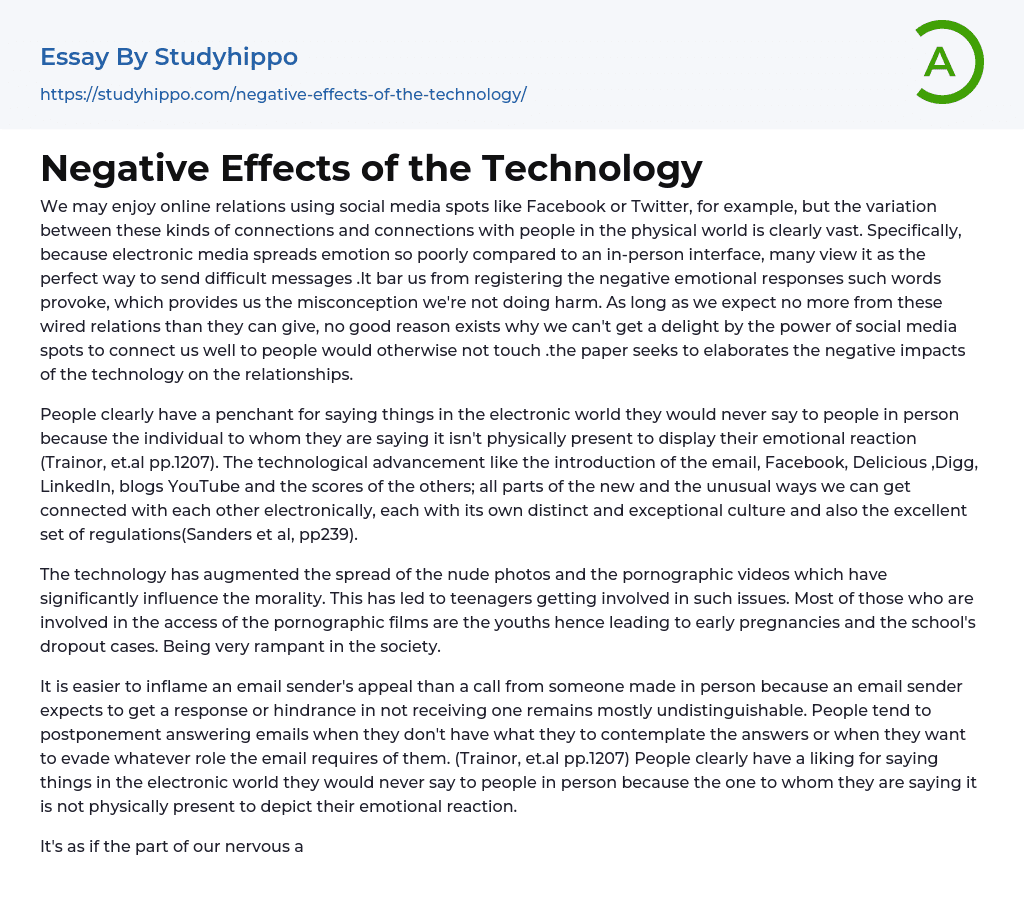The differences between online relationships through social media platforms like Facebook or Twitter and connections with people in the real world are quite significant. One major difference is that electronic media is not as effective in conveying emotions compared to face-to-face interactions. This is why many people see it as ideal for delivering difficult messages. By not witnessing the negative emotional responses that our words may provoke, we can mistakenly believe that we are not causing harm. As long as we have realistic expectations for the capabilities of these digital relationships, there is no reason why we can't enjoy the ability of social media to connect us with people we wouldn't otherwise have contact with.
The paper examines the negative impacts of technology on relationships, highlighting how individuals tend to say things online that they would never say in person due to the absence of phys
...ical presence and emotional reactions (Trainor, et.al pp.1207).
The emergence of various technologies, including email, Facebook, Delicious, Digg, LinkedIn, blogs, YouTube, and others, has transformed our electronic means of connection. Each of these platforms possesses its own distinct culture and regulations (Sanders et al., pp239). However, this technological advancement has also led to a rise in the accessibility of nude photos and pornographic videos. Consequently, moral values have been significantly impacted. As a result, teenagers are now experiencing the repercussions of these issues. It is predominantly young individuals who tend to access pornographic content which contributes to early pregnancies and higher rates of high school dropout.
According to Trainor et.al (pp. 1206-1207), it is common in society for email senders to have a stronger impact than someone speaking in person. This is because
email senders anticipate a response and it is difficult to determine if not receiving one is intentional. People tend to delay responding to emails when they are unsure of how to answer or when they want to avoid the responsibilities outlined in the email. Additionally, individuals feel more comfortable expressing themselves electronically because they cannot see the recipient's emotional reaction. It is as if the part of our nervous system that perceives others' feelings is absent when communicating online, leading us to overlook or disregard the potential harm caused by our words. Ultimately, technology has the power to either damage or improve our social skills and overall social life.
Exposure to television content can negatively impact individuals' social lives, as seen in the increased risk of teenage pregnancy associated with shows that promote sexual gratification. While separation and unemployment are also adverse consequences, they may be less prevalent compared to other issues showcased on social networking platforms (Trainor, et.al pp.1207). These platforms enable stalking behavior. In addition, excessive focus on self-presentation and online profiles provides an opportunity for individuals to showcase their self-admiration traits.
The use of technology has had a negative impact on relationships from the beginning, leading to breakups and conflicts. People take advantage of technology to insult others, expose their feelings and secrets, and engage in harmful behavior. As a result, couples and lovers often end up separating. The connection between technology and relationships is therefore opposing in nature.
Work Cited
- Trainor, Kevin J., et al. "Social media technology usage and customer relationship performance: A capabilities-based examination of social CRM."Journal of Business Research 67.6 (2014): 1201-1208.




